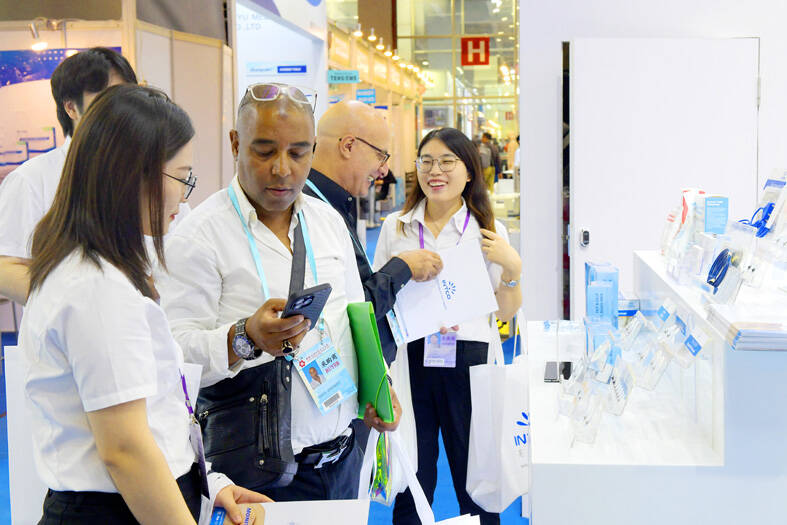China is to further expand market access and increase imports, Chinese Premier Li Qiang (李強) told a trade fair in Shanghai yesterday, amid criticism from European firms who said they wanted to see more tangible improvement in the country’s business environment.
Li told the opening ceremony of the annual China International Import Expo that the country was committed to opening up its economy, and that imports of goods and services were set to reach a cumulative US$17 trillion within the next five years.
“No matter how the world changes, China’s pace of opening up will never stall, and its determination to share development opportunities with the world will never change,” Li said.

Photo: AP
China will promote coordinated development of trade in goods and services, protect an international business environment and relax market access including lifting restrictions on foreign investment in manufacturing, he said.
The import expo drew criticism from the European Chamber of Commerce in China on Friday, which branded it a “political showcase” and urged authorities to enact more tangible measures to restore confidence in the country among European businesses.
China’s imports have slumped this year amid a slowdown in the world’s second-largest economy, although data released last month indicated that the downtrend could be starting to ease.
Li cited examples of businesses that had benefited from the show — including an Afghan carpet maker and a Japanese pharmaceutical firm, though without identifying them — and said out of the roughly 3,400 companies participating this year, over 200 had been repeat attendees for the past six years.
Countries including Australia and the US have sent large delegations to the event, which runs from Nov. 5 to 10. Participants include Micron Technology Inc, Nestle SA, Burberry Group PLC and L’Oreal SA, state media reported.
Yesterday, Australian Prime Minister Anthony Albanese, at the start of the first visit to China by a leader of his country in seven years, told the opening ceremony that dialogue and cooperation were “in all our interests.”
Last year, US$73.52 billion worth of so-called intentional deals were signed at the fair, up 3.9 percent from the previous year.
China will “actively promote” its application to join the Comprehensive Progressive Trans-Pacific Partnership (CPTPP), Li also said.
Taiwan, Ukraine, Costa Rica, Uruguay and Ecuador have also applied to join.
The CPTPP is a trade pact agreed in 2018 between 11 countries including Australia, Brunei, Canada, Chile, Japan, Malaysia, Mexico, New Zealand, Peru, Singapore and Vietnam. Britain earlier this year became the 12th member of the pact, which cuts trade barriers. China’s application is next in line to be considered by the 12 members if they are dealt with in the order they were received.

When an apartment comes up for rent in Germany’s big cities, hundreds of prospective tenants often queue down the street to view it, but the acute shortage of affordable housing is getting scant attention ahead of today’s snap general election. “Housing is one of the main problems for people, but nobody talks about it, nobody takes it seriously,” said Andreas Ibel, president of Build Europe, an association representing housing developers. Migration and the sluggish economy top the list of voters’ concerns, but analysts say housing policy fails to break through as returns on investment take time to register, making the

‘SILVER LINING’: Although the news caused TSMC to fall on the local market, an analyst said that as tariffs are not set to go into effect until April, there is still time for negotiations US President Donald Trump on Tuesday said that he would likely impose tariffs on semiconductor, automobile and pharmaceutical imports of about 25 percent, with an announcement coming as soon as April 2 in a move that would represent a dramatic widening of the US leader’s trade war. “I probably will tell you that on April 2, but it’ll be in the neighborhood of 25 percent,” Trump told reporters at his Mar-a-Lago club when asked about his plan for auto tariffs. Asked about similar levies on pharmaceutical drugs and semiconductors, the president said that “it’ll be 25 percent and higher, and it’ll

NOT TO WORRY: Some people are concerned funds might continue moving out of the country, but the central bank said financial account outflows are not unusual in Taiwan Taiwan’s outbound investments hit a new high last year due to investments made by contract chipmaker Taiwan Semiconductor Manufacturing Co (TSMC, 台積電) and other major manufacturers to boost global expansion, the central bank said on Thursday. The net increase in outbound investments last year reached a record US$21.05 billion, while the net increase in outbound investments by Taiwanese residents reached a record US$31.98 billion, central bank data showed. Chen Fei-wen (陳斐紋), deputy director of the central bank’s Department of Economic Research, said the increase was largely due to TSMC’s efforts to expand production in the US and Japan. Investments by Vanguard International

WARNING SHOT: The US president has threatened to impose 25 percent tariffs on all imported vehicles, and similar or higher duties on pharmaceuticals and semiconductors US President Donald Trump on Wednesday suggested that a trade deal with China was “possible” — a key target in the US leader’s tariffs policy. The US in 2020 had already agreed to “a great trade deal with China” and a new deal was “possible,” Trump said. Trump said he expected Chinese President Xi Jinping (習近平) to visit the US, without giving a timeline for his trip. Trump also said that he was talking to China about TikTok, as the US seeks to broker a sale of the popular app owned by Chinese firm ByteDance Ltd (字節跳動). Trump last week said that he had